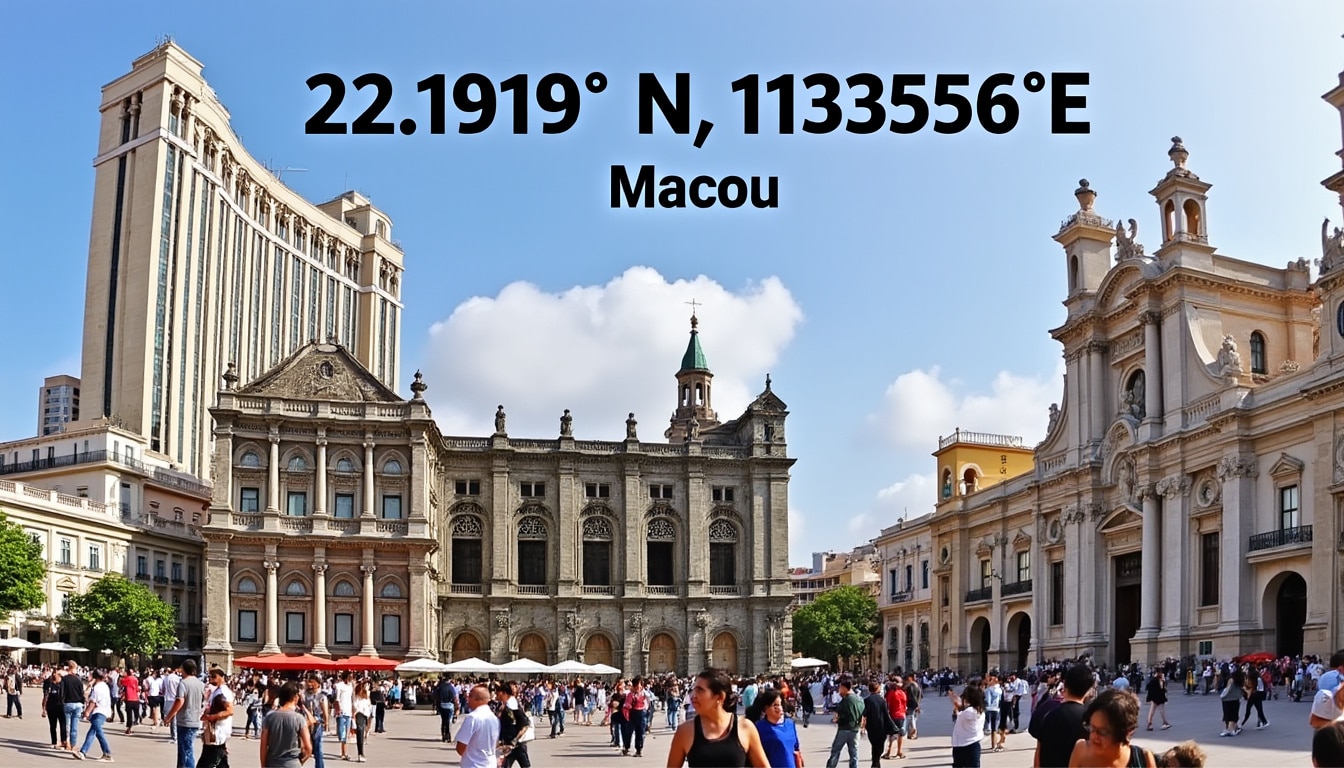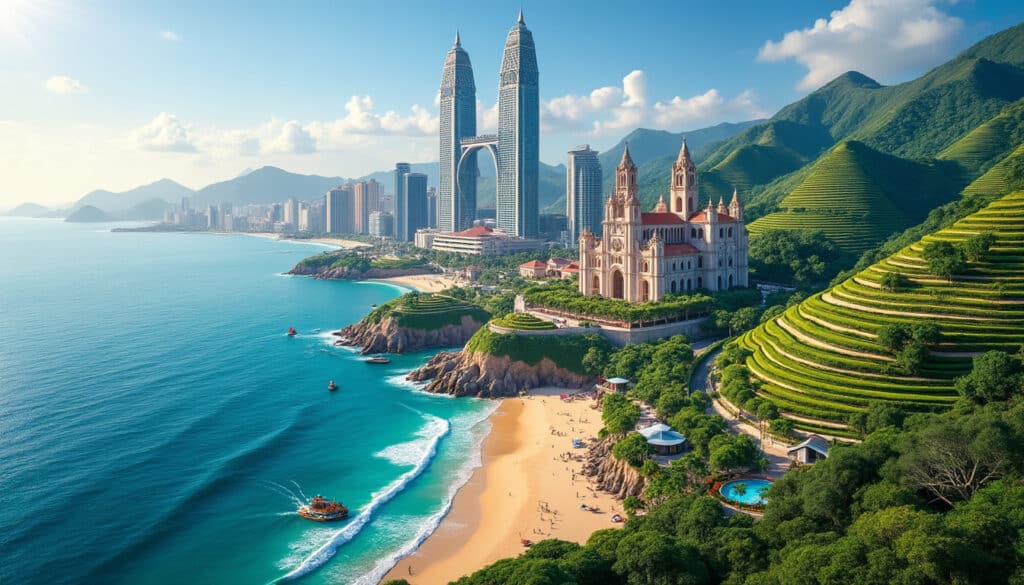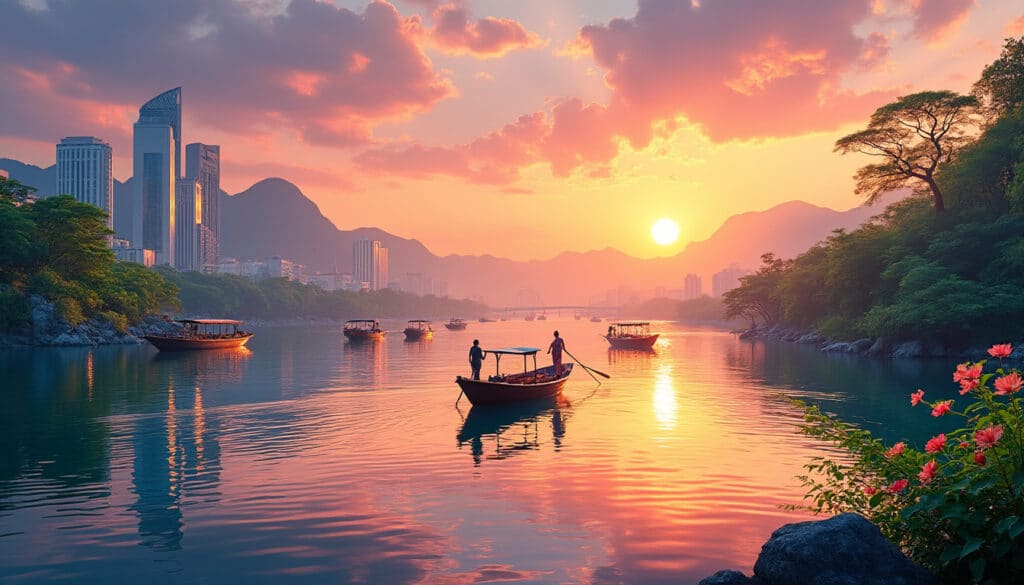Macau, often dubbed the “Las Vegas of Asia,” is a fascinating blend of European charm and Chinese traditions. Nestled on the southern coast of China, Macau is a vibrant city renowned for its bustling casino industry and rich history. As one of the two Special Administrative Regions of China, alongside Hong Kong, Macau boasts a unique cultural tapestry made more intriguing by its beautiful geography and strategic location. This article explores the precise location, geographical features, and cultural essence of Macau, offering an in-depth look at what makes it such a captivating destination.
Geographical Location and GPS Coordinates of Macau
Macau is a small yet densely populated territory on the southern coast of China. Positioned between latitudes 22.1987° N and longitudes 113.5439° E, Macau covers an area of approximately 115.3 square kilometers. This measurements make it the most densely populated region globally. Amongst the top destinations for travelers, it stands about 60 kilometers west of Hong Kong and lies at the mouth of the Pearl River Delta. The territory is bordered by the bustling city of Zhuhai in Guangdong province to the west and north, and the South China Sea to the east and south.

Macau’s location is not only significant due to its proximity to Hong Kong but also because it serves as a gateway between Mainland China and the rest of the world. This strategic placement has made Macau a crucial hub for trade, tourism, and cultural exchange. Travelers often find the Macau Government Tourist Office a useful resource for exploring the city’s attractions.
Understanding Macau’s Unique Geographical Identity
Macau is divided into several main parts: the Macau Peninsula, which is connected to mainland China; Taipa; Coloane; and the reclaimed area known as Cotai. This unique mix of geography is key to understanding the city’s distinct identity. The Cotai Strip, for example, is home to integrated resorts such as The Venetian Macao and City of Dreams Macau, making it a prime location for entertainment and tourism.
Each district has its own charm and attractions. While the historical peninsula hosts a rich array of colonial architecture and cultural sites, Cotai offers the glitz and glamour of casinos and luxury shopping. To effectively navigate through Macau, one can use the Macau Maps & Facts – World Atlas for detailed mapping. Whether it’s a stroll through the historic Senado Square or an evening at a Galaxy Entertainment Group casino, Macau promises an unforgettable experience.
- 📍 Vibrant cultural fusion of East meets West
- 🌏 Strategic location at the Pearl River Delta
- 🎰 Home to globally renowned casinos
- 🏛️ Rich colonial architecture and history
| Feature | Details | Emoji |
|---|---|---|
| Latitude | 22.1987° N | 🧭 |
| Longitude | 113.5439° E | 🗺️ |
| Area | 115.3 km² | 📏 |
Those venturing to Macau will find it an accessible and fascinating destination. Be it due to its rich history as a former Portuguese colony or its modern-day allure, Macau remains a must-visit location on any Asia travel itinerary.
The Unique Cultural Landscape and Historical Context of Macau
Macau is a unique cultural melting pot where East truly meets West. This city, with a vibrant population of approximately 696,100 as of 2025, reflects a blend of Chinese traditions and Portuguese colonial heritage. Situated in East Asia, Macau spent over 400 years under Portuguese rule before being handed back to China in 1999. This fusion of cultures is evident in its cuisine, architecture, and the official languages: Chinese and Portuguese.
While the colonial history of Macau contributes to its distinct identity, its location has also played a pivotal role in shaping its culture. The combination of Chinese roots and European influence has resulted in a rich tapestry of festivals, culinary delights, and architectural wonders. The city boasts an array of UNESCO World Heritage sites, such as the Ruins of St. Paul’s and the A-Ma Temple, showcasing its historical depth.
Cultural initiatives spearheaded by the Macau Cultural Affairs Bureau further preserve and celebrate this rich heritage, organizing events, exhibitions, and educational programs. Furthermore, the tourism sector, led by the Macau Government Tourist Office, actively promotes this unique cultural landscape, drawing millions of visitors each year.
Macau’s Gastronomy and Festivities
Macau’s culinary scene is another example of its cultural blending, often referred to as ‘Macanese’ cuisine. This unique style combines Chinese cooking techniques with Portuguese ingredients, creating a flavor profile like no other. Famous dishes such as African Chicken and Egg Tarts reflect this fusion and are integral to Macau’s identity.
The city’s annual events and festivals also highlight its cultural vibrancy. The Macau Grand Prix, for instance, is a gathering that draws crowds globally, while the lively Chinese New Year celebrations spotlight traditional customs and practices. These events are pivotal in fostering a sense of community and cultural pride among residents and are a major draw for international tourists.
- 🍜 Unique Macanese Cuisine
- 🎉 Vibrant and diverse festivals
- 🏛️ Rich architectural heritage
- 🎨 Active cultural initiatives
| Cultural Element | Description | Emoji |
|---|---|---|
| Language | Chinese and Portuguese | 🗣️ |
| Cuisine | Macanese (Fusion) | 🍽️ |
| Festivals | Macau Grand Prix, Chinese New Year | 📅 |
Whether you are a history enthusiast, a food lover, or simply looking for vibrant culture, Macau offers a rich tapestry of experiences waiting to be explored.
Macau’s Infrastructure and Tourism Development
The infrastructure of Macau is pivotal in supporting its thriving tourism industry. With modern transportation systems, including the Macau International Airport, the city is well-prepared to accommodate the influx of tourists. The airport serves as a region’s major gateway, connecting Macau with the rest of Asia and the world. Its convenient location near key attractions like the Macau Tower makes it ideal for both leisure and business travelers.
Macau’s infrastructure development is also evident in its hospitality industry, predominantly financed by major players such as Sands China Ltd. and Wynn Macau. These industry giants have contributed to building a skyline filled with luxury hotels, shopping centers, and integrated resorts. This development not only boosts the economy but also ensures visitors have a world-class experience during their stay.
Transportation and Accessibility in Macau
The transportation network in Macau is designed for ease and convenience, ensuring that getting around the city is both efficient and pleasant. Public buses, ferries, and trolleys operate extensively, connecting various parts of the city seamlessly. The Light Rapid Transit (LRT) system provides an additional layer of connectivity for visitors looking to explore the city independently.
- 🏨 Growing number of luxury accommodation options
- ✈️ Well-connected through Macau International Airport
- 🚍 Extensive public transport system
| Infrastructure Element | Details | Emoji |
|---|---|---|
| Airport | Macau International Airport | ✈️ |
| Major Resorts | Sands China Ltd., Wynn Macau | 🏢 |
| Transport | Buses, LRT | 🚍 |
With developments continuously underway, Macau’s infrastructure is set to further enhance the region’s appeal to global tourists, combining comfort and style with accessibility.
Macau’s Gambling Industry and Entertainment Scene
Macau’s gambling and entertainment sectors are pillars of its economy, often overshadowing even Las Vegas in terms of revenue. The city houses some of the world’s most opulent casinos, such as The Venetian Macao and the City of Dreams Macau. These establishments are not just gambling centers but comprehensive entertainment resorts offering shopping, dining, and recreational activities.
The city’s vibrant nightlife and entertainment scene attract millions of visitors each year, contributing significantly to the regional economy. The efficiencies of Macau’s travel networks, alongside robust casino industry regulations, make it a secure and alluring destination for international travelers.
Family and Cultural Attractions in Macau
Aside from gambling, Macau offers a myriad of attractions suitable for families and cultural enthusiasts. The Macau Museum provides insight into the city’s fascinating history, while the newly renovated Aquarium at the Macau Fisherman’s Wharf offers a refreshing family-friendly visit. The Macau Tower, renowned for its breathtaking views and adventurous activities like bungee jumping, is another highlight for thrill-seekers.
- 🎰 Renowned global casino hub
- 🎵 Diverse entertainment options
- 📜 Rich cultural attractions
- 👨👩👧👦 Family-friendly activities
| Attraction | Description | Emoji |
|---|---|---|
| Casinos | The Venetian, City of Dreams | 🎰 |
| Museum | Macau Museum, Maritime Museum | 🏛 |
| Tower | Macau Tower | 🗼 |
The fusion of entertainment and culture ensures Macau has something for everyone, making it a premier choice for global tourism pursuits.
Economic Impact and Future Prospects of Macau
Macau’s unique location and thriving industries have made it one of the wealthiest regions in Asia. While heavily reliant on the gambling sector, recent years have seen diversification efforts to boost other areas such as cultural tourism and infrastructure development. The Macau government is invested in promoting sustainable growth, ensuring the region retains its allure while also protecting its cultural and natural resources.
International collaborations and local initiatives, particularly in the tech and tourism sectors, are helping to pave the way for future economic stability. Furthermore, advancements in travel and trade policies have strengthened Macau’s position as a gateway city, bridging East and West.
Sustainability Initiatives in Macau
Macau’s government is committed to creating a balanced future, with sustainability at the core of development plans. Recent initiatives focus on energy efficiency, reducing carbon footprints, and protecting the Pearl River Delta’s marine ecosystem. The alliances between major resorts and environmental organizations showcase significant steps towards a greener Macau.
- 💰 Significant economic growth from tourism
- 🌱 Emphasis on sustainability and ecology
- 👥 Partnerships with international businesses
| Future Initiative | Description | Emoji |
|---|---|---|
| Economic Growth | Diversification in sectors | 📈 |
| Sustainability | Environmental initiatives | 🌍 |
| Global Partnerships | International collaborations | 🤝 |
Macau’s future looks promising, with strategic initiatives set to propel the region into a new era of economic prosperity and cultural preservation.
Frequently Asked Questions – Macau
- What is the main language spoken in Macau? The official languages are Chinese and Portuguese, with Cantonese and English widely spoken.
- How can I travel to Macau? Macau is easily accessible through the Macau International Airport or by ferry from Hong Kong.
- Is Macau safe for tourists? Yes, Macau is considered safe for tourists, with low crime rates and friendly locals.
- What currency is used in Macau? The currency used is the Macanese pataca (MOP).
- Are there any specific travel restrictions to be aware of? For the latest travel regulations, visiting the official tourist and government websites is advisable.

Renowned for its vibrant blend of cultures and captivating landscapes, Macau’s geographical allure is a reflection of its unique history and dynamic urban development. Situated on the southern coast of China, Macau is not only a hub for tourism and…

Geographical features of Macau
Macau, often referred to as the “Las Vegas of the East”, is an enchanting destination brimming with cultural history and breathtaking scenery. Situated on the southern coast of China, this special administrative region, known for its vibrant Macau Tourism, captures…

The vibrant city of Macau is globally renowned for its opulent casinos and rich cultural heritage. Yet, amid its urban tapestry, it surprisingly hosts a diverse and thriving natural ecosystem. For the keen observer, Macau’s pockets of green and wildlife…


